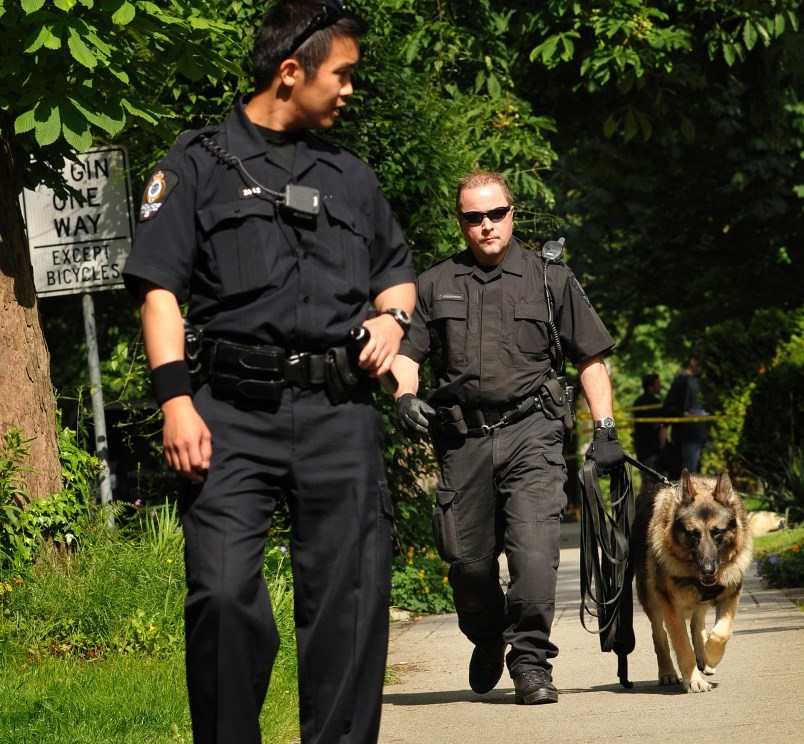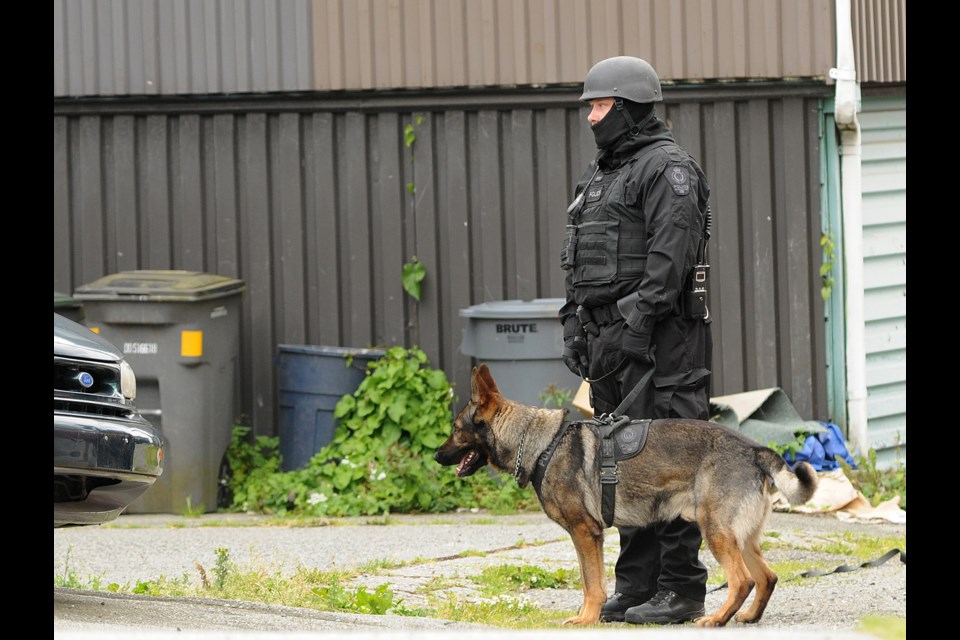You’ll be happy to know that two Vancouver police dogs nabbed two suspects in two separate burglaries last week.
The dogs’ names are Bailey and Vader.
I know this because I follow the VPD’s canine unit on Twitter. The tweet regarding Bailey and Vader doesn’t provide details on where the break-ins occurred, or how Bailey and Vader nabbed the suspects.
Did the dogs have to bite these suspects to stop them from running?
Not sure.
But I do know that Vancouver police dogs bit 122 people -- between April 1, 2016 and March 31, 2017 -- and injuries were severe enough that treatment was required at a hospital. I got those statistics from the Office of the Police Complaint Commissioner.
Does 122 seem like a lot?
I’m sure each and every one of those people who were bitten and required treatment would answer in the affirmative. And I’m sure the VPD’s dog handlers will say that, in every case, those same people had it coming.
“We’re satisfied in each case that the deployment of the dog was appropriate,” said Rollie Woods, the deputy police complaint commissioner, of the Vancouver cases. “And if it wasn’t, we would follow up more and likely order an investigation into the officer’s conduct.”
I wanted to discuss the stats with the head of the VPD’s canine unit, but I instead received an emailed statement from Const. Jason Doucette, one of the department’s media liaison officers. Call me old school, but I always prefer to interview the person in charge.
I wanted some context and perspective on the 122 bites.
After all, bites actually dropped to 122 from 141 for the April-to-March period in the 2015/2016 year. I’m interested to know why. I’m also interested to know why there were 73 bites recorded in 2014/2015 and an even lower amount – 57 – in 2013/2014.
The statistics show an escalation over the last two years in police dogs biting people so severely that they required treatment in hospital. Doucette’s response didn’t directly comment on the escalation, but provided some context.
“Fluctuations from year to year can be accounted for by the number of calls that the dogs attend and deploy, and the number of deployable dogs throughout that year, often affected by dog or handler injury,” he wrote.
Delta and Abbotsford police departments recorded 13 dog bites each for the 2016/2017 period, while New Westminster and Victoria totalled 12 each. It’s a fact those four departments are smaller, have fewer dogs and attend fewer calls.
Doucette pointed out Delta and New Westminster departments are “integrated with the RCMP patrolling the entire Lower Mainland. Thus their dog bites may not have even occurred in the jurisdiction they are from.”

Vancouver has the largest municipal dog squad in B.C. — 15 teams — and answers more than 7,000 calls per year; I was told an average of 10,000 calls per year when I looked at this issue back in 2016.
So fewer calls, but more bites?
The dogs are trained to track and catch suspects involved in such crimes as burglaries and robberies, recover evidence and search out drugs, guns and explosives. They also pose for a popular calendar that is currently on the VPD’s website.
Doucette said there “has not been one substantiated complaint or examination of a reportable injury by the Office of the Police Complaint Commissioner, or the Independent Investigations Office since civilian oversight was introduced.”
That statement didn’t seem accurate to me.
I thought of Vick Supramaniam, who had a portion of his ear torn off by a dog in a Sept. 19, 2016 incident in New Westminster. The dog also grabbed the man’s leg and pulled him down a hill. Vancouver police were attempting to arrest suspects connected to a kidnapping and homicides at a house on Dieppe Place, near Grandview Highway and Boundary Road.
The VPD apologized to Supramaniam, who was considered an innocent victim. Even so, the police made it clear at the time of the incident what was at stake in rescuing a hostage.
“In this situation, I’d be willing to guarantee that if they got away, that hostage would be dead,” said Const. Brian Montague, who was a media liaison at the time of the interview I conducted with him in October 2016.“Obviously, there’s no intent to bite someone that’s not involved in criminal activity like that. It’s an unfortunate set of circumstances that resulted in this person getting bit, who was clearly not involved.”
The Independent Investigations Office investigated Supramaniam case. I followed up to learn the case is still open and that – as of Feb. 1 -- it is one of seven the agency is investigating related to bites from Vancouver police dogs.
Back to Doucette, who finished his email by writing that Vancouver residents should be “extremely proud” of the department’s dog teams.
“They work very hard to keep Vancouver safe by apprehending criminals who are actively running, hiding, or resisting,” he said.
New rules for all B.C. police dogs and their handlers became effective Sept. 1, 2015. The rules require all officers to complete a detailed report for each bite incident, take photographs of injuries and provide related data to the police services division of the Ministry of Justice.
The new standards — the first of their kind in Canada — also require annual testing of every dog handler team. Notably, dogs must demonstrate their ability to be called off a suspect, remain under control while biting and promptly release a bite upon hearing a handler’s command.
Meanwhile, according to the VPD's canine unit Twitter account, police dogs Hunter, Jack and Hawk were busy over the weekend and nabbed suspects involved in burglaries, thefts from vehicles and tracking others from two dumped vehicles related to different offences. The tweet came with hashtags, #teamwork #GoodDogs.
@Howellings



